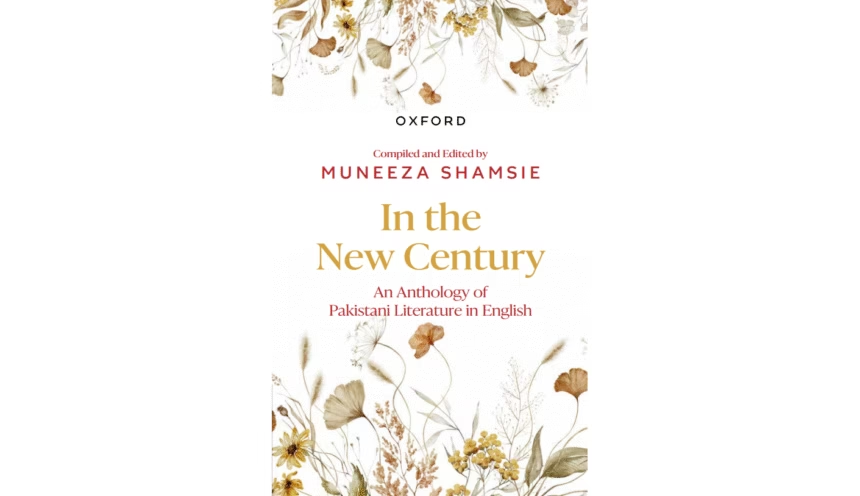PUBLISHED
July 27, 2025
KARACHI:
Literature often arrives before theory finds a name for it. Long before Pakistani writing in English was granted the dignity of critical attention, poets and novelists were already grappling with the dilemmas of belonging, the dislocations of Partition, and the uneven legacies of empire. What was once regarded with suspicion or condescension has become an essential register of Pakistan’s modern literary imagination — a way to reflect on the unfinished stories that history leaves behind.
In the New Century: An Anthology of Pakistani Literature in English stands as both an affirmation and an inquiry into that transformation. Edited by Muneeza Shamsie, this anthology follows her earlier collection, A Dragonfly in the Sun, which first attempted to chart the contours of Pakistani English literature. Where the earlier volume sought to establish the field’s existence and seriousness, this sequel arrives in a changed landscape. Over the two decades it covers — from 1997 to 2017 — Pakistani Anglophone writing has achieved international prominence, developed new idioms, and begun to address audiences both within and beyond the country’s borders.
The anthology assembles the work of 86 writers, reflecting a remarkable breadth of forms. It comprises poetry, short stories, novel excerpts, memoirs, life writings, essays, and drama. This diversity is not merely a matter of genre. Still, of sensibility: it suggests that Pakistani English literature has evolved into a domain capacious enough to hold multiple, sometimes conflicting, conceptions of identity and cultural legitimacy.
The first contributor in the volume is Taufiq Rafat, a poet often credited with pioneering an indigenous voice in English. His inclusion underscores the lineage of literary experiment that has shaped Pakistani writing since decades after independence. Rafat and his contemporaries were among the first to insist that English could be adapted to local rhythms, landscapes, and preoccupations without surrendering its expressive power. In his work, the language of the coloniser is refashioned to accommodate the cadences of Punjabi and Urdu sensibility, a process that has inspired generations of poets since.
At the other end of the anthology is Sarvat Hasin, part of a younger generation whose writing signals the continuity of this project into the twenty-first century. Between these two writers lies an array of perspectives that together document how Pakistani English literature has expanded its thematic and stylistic range, becoming both more introspective and more outward-looking.
The introduction situates this development in a historical and cultural context. Shamsie traces how, in the years after 1947, English was viewed with suspicion by nationalist critics, who saw it as the language of colonial administration and social privilege. Yet she also emphasises a different dimension: the charge that English writing belonged to a social elite, disconnected from vernacular traditions and ordinary lives. While this association with privilege has persisted, the anthology demonstrates how, over time, English has also become a medium for serious engagement with Pakistani histories and sensibilities. What once seemed alien could be reclaimed, transformed by literary imagination, and reshaped into a language capable of expressing indigenous experience with authenticity.
The anthology reveals how this process has matured. The poetry section, which occupies a substantial part of the collection, includes figures such as Adrian A. Hussain, Waqas Khwaja, Moniza Alvi, Imtiaz Dharker, and Kaleem Omar. Their inclusion illustrates the range of poetic practice: from reflections on Partition and displacement to meditations on language, faith, and intimacy. Among them, poets like Kaleem Omar — and to some extent Waqas Khwaja — have engaged with the ghazal form, adapting its classical structures within English. Shamsie’s introduction highlights such experiments as part of a broader effort to create a Pakistani idiom in the language of the former coloniser, demonstrating that English could be made responsive to traditional literary forms rather than simply replacing them.
The prose selections cover both fiction and life writing. Novel excerpts and short stories by Kamila Shamsie, Mohsin Hamid, Mohammed Hanif, Uzma Aslam Khan, and Bapsi Sidhwa reflect the increasingly international profile of Pakistani writers. In the period the anthology spans, several of these authors received global recognition, their work shortlisted for major prizes and translated into multiple languages. Through their stories, Pakistani narratives entered wider conversations about migration, religious extremism, and postcolonial belonging. Their inclusion here testifies not only to their literary accomplishment but also to the central role they have played in reshaping how Pakistan is perceived abroad.
Memoirs and essays contribute a different texture to the collection. Works by Sara Suleri Goodyear, Fatima Bhutto, and Fawzia Afzal-Khan address the interplay between family history and national trauma. These pieces highlight a central preoccupation of Pakistani writing in English: the effort to reconcile the private with the political, the remembered with the inherited. Memoir in this context is never a purely personal mode; it is an inquiry into how individual lives are marked by the violence and upheaval of collective experience.
Drama and theatrical writing also appear in the anthology. Hanif Kureishi and Ayub Khan Din are included not because they write about Pakistan directly, but because their work reflects the diasporic dimensions of Pakistani identity. Their plays highlight how cultural authenticity is shaped not just by geography but by experience, negotiation, and the ambiguities of living between worlds.
Diasporic identity constitutes another major theme. Writers whose lives span continents — Moniza Alvi, Imtiaz Dharker, and Hanif Kureishi — explore questions of partial belonging and the longing for a home that may never fully exist. These contributions affirm that Pakistani literature in English cannot be confined to the homeland. It is also a literature of migration, of second-generation inheritance, and lives unfolding in the spaces of airports and border crossings. In gathering these voices, the anthology underscores the necessity of recognising diaspora as an integral aspect of the Pakistani Anglophone tradition.
Several thematic concerns emerge across the volume. Partition remains a defining subject, approached not simply as a historical rupture but as an enduring source of memory and grief. For many of the writers included here, Partition is less an event than a recurring trauma — a set of absences and unspoken losses that continue to shape the stories families tell about themselves. The 1971 war and the creation of Bangladesh, long neglected in Pakistani English literature, receive attention in selections by Sorayya Khan and Durdana Soomro, among others. These works confront the dangers of selective memory and the ethical challenge of acknowledging complicity as well as suffering.
The anthology also foregrounds the War on Terror as a shaping context for contemporary writing. In both fiction and poetry, authors grapple with the moral and psychological consequences of a period marked by violence, fear, and surveillance. These are not simply topics imported from the headlines; they are lived realities that have left their mark on the language itself, giving rise to new metaphors of rupture and dislocation.
One of the anthology’s contributions is to show how literary form itself has been transformed by these pressures. The presence of the ghazal alongside free verse, the mingling of satire with elegy, and the juxtaposition of memoir with fiction suggest a tradition that has learned to resist the simplifications of cultural explanation. Rather than offering a single, unified image of Pakistani identity, the anthology presents a field of tensions: between nostalgia and critique, between local rootedness and transnational movement, between inheritance and invention.
If A Dragonfly in the Sun was an effort to legitimise Pakistani English writing, In the New Century: An Anthology of Pakistani Literature in English feels like a record of its maturation. It no longer seeks to prove that Pakistani literature in English exists or deserves a place. Instead, it sets out to document the complexity of that existence and the questions it continues to raise. The anthology refuses to impose closure on a tradition still in formation.
More than a collection of texts, the anthology becomes a map of sensibility — a way to trace how writers have responded to the dilemmas of language, belonging, and history. Its significance lies not only in the range of material it gathers, but in the perspective, it models. By treating Pakistani English literature as a living tradition — shaped by argument, experiment, and dissent — it invites readers to see it not as a supplement to Urdu and regional literatures, but as a vital dimension of contemporary Pakistani culture.
At a time when cultural identities are often reduced to singular narratives, this volume emphasises the value of complexity. It affirms that literature is most vital when it admits contradiction, when it resists the consolations of nostalgia, and when it dares to question the very categories that define it. In the New Century ultimately stands as both an archive and a provocation — a testament to the enduring conviction that literature, even when contested, remains one of the most powerful ways a society can imagine itself anew.
In the New Century: An Anthology of Pakistani Literature in English
Compiled and Edited by Muneeza Shamsie
Published by Oxford University Press Pakistan, 2025
Pages: 600
Price PKR 2495/-
ISBN: 978-0-19-906091-7
The writer is a Pakistan-born and Austria-based poet in Urdu and English. He teaches South Asian literature and culture at Vienna
All facts and information are the sole repsonsibility of the writer








